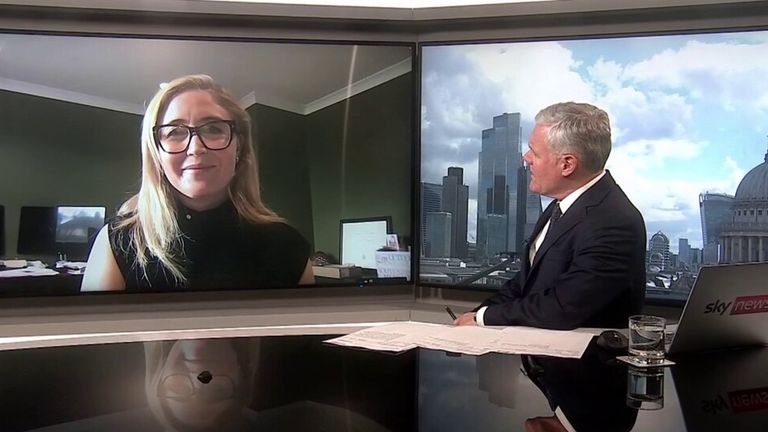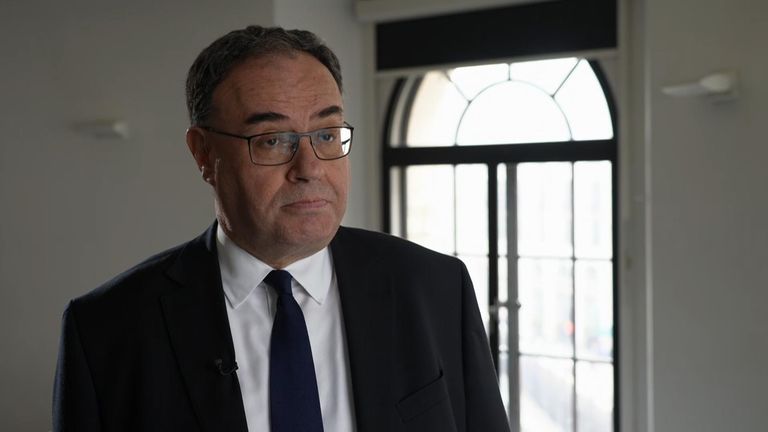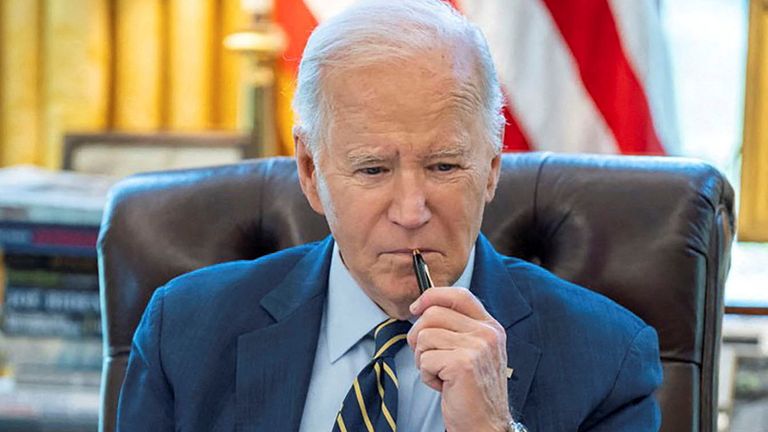Bank of England governor talks up interest rate cut prospects as inflation eases to 3.2%
While BoE chief Andrew Bailey sees further progress in the battle against inflation, most financial market bets are now firmly placed on a first UK interest rate cut not happening until August at least, which will likely disappoint mortgage holders.
Wednesday 17 April 2024 11:39, UK
The governor of the Bank of England has signalled the UK is still on course for an interest rate cut as official figures show a further easing in the pace of price growth in the economy.
Andrew Bailey was speaking hours before the Office for National Statistics (ONS) revealed that the consumer prices index (CPI) measure of inflation slowed to 3.2% in the 12 months to March - the weakest level for two-and-a-half years.
That was down from the 3.4% figure measured the previous month but slightly above economists' expectations.
ONS chief economist Grant Fitzner said of the shifts seen last month: "Once again, food prices were the main reason for the fall, with prices rising by less than we saw a year ago.
"Similarly to last month, we saw a partial offset from rising fuel prices."
A lower inflation rate is welcome for long-suffering households who are seeing a rise in spending power due to wages rising at a faster pace than prices.
A further boost is expected to come from the Bank of England in the coming months as energy-driven inflation continues to ease, with a sharp reduction in CPI this month being widely tipped to take the main measure of inflation towards the Bank's 2% inflation target.
Some economists expect the Bank to begin the process of withdrawing its medicine to combat inflation in June.
UK is 'disinflating'
An interest rate cut, from the current 5.25% level, would have the effect of trimming many borrowing costs that have exacerbated the squeeze on personal finances such as through higher mortgage rates.
Mr Bailey told an International Monetary Fund event in Washington: "In the UK we're disinflating at what I call full
employment.
"I see, you know, strong evidence now that that process is working its way through.
"Our judgement with interest rates is 'how much do we need to see now to be confident of the [disinflation] process'."
Read more on Sky News:
UK set to grow less than expected this year as IMF revises forecast
UK economy grows slightly for second month in a row
Retail sales flatline as wet weather dampens demand
Growing view that Bank may hold off on rate cut
But there is a growing school of thought that the Bank may have to hold off on a rate cut.
LSEG data shows a majority of financial market participants now expect a first rate cut in August or even September.
The worries include the threat posed by rising oil costs as the conflicts in the Middle East continue to evolve and the fact that UK wage growth is now running at levels almost double the inflation rate.
Another is emerging from the United States.
There, the chair of its central bank has warned that the chances of an imminent interest rate cut have faded as the world's largest economy runs hot.
Dynamics of inflation in UK different to US
The problem for the Bank of England in the wake of Jay Powell's remarks on Tuesday is that any UK rate cut ahead of the Federal Reserve risks weakening the value of the pound against the dollar.
Read more:
Why a 'vibecession' is hurting Biden - despite US economy booming
Be the first to get Breaking News
Install the Sky News app for free


That would raise the cost of importing key goods priced in dollars such as commodities including oil - and stoke inflation.
Mr Bailey acknowledged: "The dynamics for inflation are rather different now, between Europe... and the US.
"I think there's more demand-led inflation in the US than we're seeing," he added.






